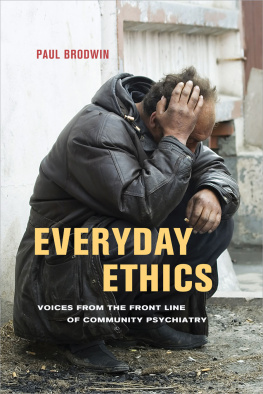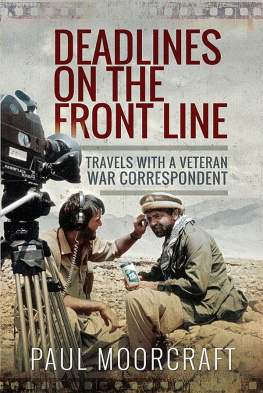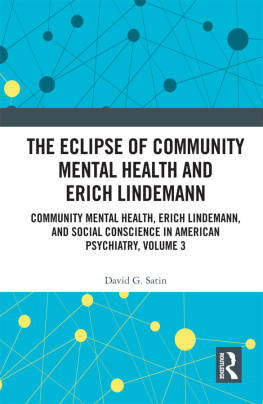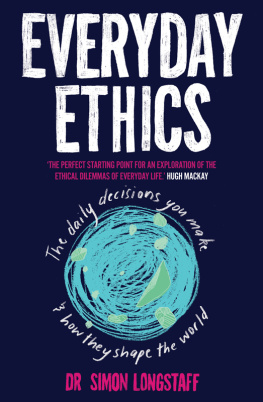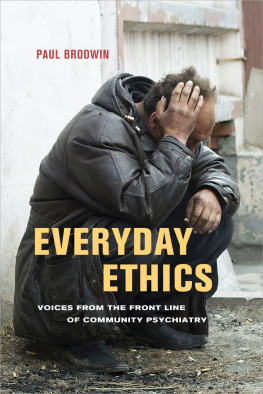Brodwin Paul - Everyday ethics: voices from the front line of community psychiatry
Here you can read online Brodwin Paul - Everyday ethics: voices from the front line of community psychiatry full text of the book (entire story) in english for free. Download pdf and epub, get meaning, cover and reviews about this ebook. City: Berkeley, year: 2013, publisher: University of California Press, genre: Politics. Description of the work, (preface) as well as reviews are available. Best literature library LitArk.com created for fans of good reading and offers a wide selection of genres:
Romance novel
Science fiction
Adventure
Detective
Science
History
Home and family
Prose
Art
Politics
Computer
Non-fiction
Religion
Business
Children
Humor
Choose a favorite category and find really read worthwhile books. Enjoy immersion in the world of imagination, feel the emotions of the characters or learn something new for yourself, make an fascinating discovery.
- Book:Everyday ethics: voices from the front line of community psychiatry
- Author:
- Publisher:University of California Press
- Genre:
- Year:2013
- City:Berkeley
- Rating:4 / 5
- Favourites:Add to favourites
- Your mark:
- 80
- 1
- 2
- 3
- 4
- 5
Everyday ethics: voices from the front line of community psychiatry: summary, description and annotation
We offer to read an annotation, description, summary or preface (depends on what the author of the book "Everyday ethics: voices from the front line of community psychiatry" wrote himself). If you haven't found the necessary information about the book — write in the comments, we will try to find it.
Brodwin Paul: author's other books
Who wrote Everyday ethics: voices from the front line of community psychiatry? Find out the surname, the name of the author of the book and a list of all author's works by series.
Everyday ethics: voices from the front line of community psychiatry — read online for free the complete book (whole text) full work
Below is the text of the book, divided by pages. System saving the place of the last page read, allows you to conveniently read the book "Everyday ethics: voices from the front line of community psychiatry" online for free, without having to search again every time where you left off. Put a bookmark, and you can go to the page where you finished reading at any time.
Font size:
Interval:
Bookmark:

Everyday Ethics
Everyday Ethics
Voices from the Front Line of
Community Psychiatry
Paul Brodwin

UNIVERSITY OF CALIFORNIA PRESS
BerkeleyLos AngelesLondon
University of California Press, one of the most distinguished university presses in the United States, enriches lives around the world by advancing scholarship in the humanities, social sciences, and natural sciences. Its activities are supported by the UC Press Foundation and by philanthropic contributions from individuals and institutions. For more information, visit www.ucpress.edu.
University of California Press
Berkeley and Los Angeles, California
University of California Press, Ltd.
London, England
2013 by The Regents of the University of California
Library of Congress Cataloging-in-Publication Data
Brodwin, Paul.
Everyday ethics : voices from the front line of community psychiatry / Paul Brodwin.
p. ; cm.
Includes bibliographical references.
ISBN 978-0-520-27478-5 ISBN 978-0-520-27479-2
eISBN 9780520954526
1. Title.
[DNLM: 1. Community Mental Health Services.
2. Community Psychiatryethics. WM 30.6]
362.19689-dc232012030149
Manufactured in the United States of America
22 21 20 19 18 17 16 15 14 13
10 9 8 7 6 5 4 3 2 1
In keeping with a commitment to support environmentally responsible and sustainable printing practices, UC Press has printed this book on Rolland Enviro100, a 100% post-consumer fiber paper that is FSC certified, deinked, processed chlorine-free, and manufactured with renewable biogas energy. It is acid-free and EcoLogo certified.
For the clients and staff at Eastside Services
The work of treating the chronically mentally ill in the community, often tedious, monotonous, apparently endless, and emotionally draining, represents a heavy load for any individual to manage alone.
Mary Ann Test, Continuity of Care in Community Treatment (1979)
What matters is to give each person back the confidence that people can have in themselves, that they can lose in any social milieu, by some accident, by some event happening in your life.... Because I think that what is happening is people's heads is... they've come to the end... they're at the end... of nothing. You have to find a way out.
Social worker quoted in Pierre Bourdieu et al., The Weight of the World: Social Suffering in Contemporary Society (1992)
Contents
Acknowledgments
This book is a collective project, and it would not exist without the longstanding generosity of colleagues and the support of friends. I owe my deepest debt to the staff and clients of the pseudonymous Eastside Services. Staff members allowed me to enter their tightly knit work group and share their frustrations and (rare) triumphs. They created a role for meas friend, witness, and interested outsideras they struggled to care for some of the most disenfranchised people in the United States. At the same time, individuals living with severe and disabling symptoms graciously accepted my intrusion into their lives. Their personal resilience and strategies for survival pushed me to rethink my personal and professional commitments. While writing this book, I have been honored to work alongside mental health advocates who self-identify as consumers, clinicians, activists, or all three. Their devotion to systemic reform is infectious, and I hope this book contributes to the changes that we all urgently need. In a book about the ethics of mental health care, I must scrupulously avoid identifying people even remotely connected to my research site. I thank them all, and I ask their forgiveness for any errors of fact or interpretation.
Long before beginning fieldwork, I benefitted from the guidance of many individuals. Robert (Skip) Nelson extended a warm mid-career welcome into bioethics. Carl Elliott, Tod Chambers, Ray DeVries, and Laurie Zoloth provided models of engagement and disciplinary self-awareness that helped me hone the fundamental questions about everyday ethics. Reaching further back, I owe my passion for this book to Arthur Kleinman, Byron Good, and Mary-Jo DelVecchio Good, the founders of the medical anthropology program at Harvard. Their mentorship and support over the years have been crucial to my professional growth. Steve Piker, now retired from Swarthmore College, laid the foundation for my career and provided my first model of humane anthropological scholarship.
Since completing fieldwork, my thinking has benefitted from a moveable conversation about anthropology, psychiatry, and social work. At the University of Chicago, Judy Farquhar and Summerson Carr have provided invaluable support, and they graciously invited me several times to present my work to their students. At the University of Paris, Livia Velpry and Anne Lovell shared their insights into the vexed worlds of consent, constraint, and community psychiatry, and I greatly appreciate their spirit of collaboration. Closer to home, my colleagues Kalman Applbaum and Michael Oldani invited me to join their research project on pharmaceutical compliance, and their ideas improved my analysis of this topic. Janelle Taylor, Erica Bornstein, and Richard Grinker offered useful suggestions and encouragement at various times during the long writing process. Sharon Kaufman's ideas and professional support also leave important traces on my own thinking.
The University of Wisconsin-Milwaukee provided a congenial atmosphere for research and writing, and I would like to thank all my colleagues in the Department of Anthropology. Department Chairs Robert Jeske, Patrick Gray, and Thomas Malaby, along with Deans Richard Meadows and Rodney Swain, helped create opportunities for serious intellectual work, and I am in their debt. The support of the university's Center for 21st Century Studies was crucial early in this project. At the Medical College of Wisconsin, the opportunities for dialogue among humanities, social sciences, and medical practice have improved this book, and I am grateful for the friendship and administrative skills of Art Derse, David Seal (now at Tulane), and Julia Uihlein.
I thank Reed Malcolm and Stacy Eisenstark at the University of California Press for seeing promise in my manuscript and expertly shepherding the book to completion. Thanks also to Rebecca Lester and an anonymous peer reviewer who helped me clarify my main argument and make the book more accessible. I also thank the National Science Foundation, which funded my research (BCS-0522263). Cherie Sixbey, director of the Assertive Community Treatment Association, invited me to address numerous audiences of social workers and psychiatrists. I also thank the editors and peer reviewers of the journals that published previous versions of this research. Portions of Chapter Two appeared in The Assemblage of Compliance in Psychiatric Case Management, Anthropology and Medicine (UK) 2010, 17(2):129-143, as well as Futility in the Practice of Community Psychiatry, Medical Anthropology Quarterly , 2011, 25(2):189-208. Portions of Chapter Six appeared in The Coproduction of Moral Discourse in U.S. Community Psychiatry, Medical Anthropology Quarterly 2008, 22(2):127-147.
Finally, the difficulties of research and writing have been tempered by a small local networka source of challenge, support, and inspiration. The patience and persistent inquiries of Tom Reed, Richard Frank, and the pseudonymous Neil Hansen have all found their way into this book. Most importantly, my deepest thanks to Huong DangVu, whose life work illuminates the contours of care and its human core.
Next pageFont size:
Interval:
Bookmark:
Similar books «Everyday ethics: voices from the front line of community psychiatry»
Look at similar books to Everyday ethics: voices from the front line of community psychiatry. We have selected literature similar in name and meaning in the hope of providing readers with more options to find new, interesting, not yet read works.
Discussion, reviews of the book Everyday ethics: voices from the front line of community psychiatry and just readers' own opinions. Leave your comments, write what you think about the work, its meaning or the main characters. Specify what exactly you liked and what you didn't like, and why you think so.

